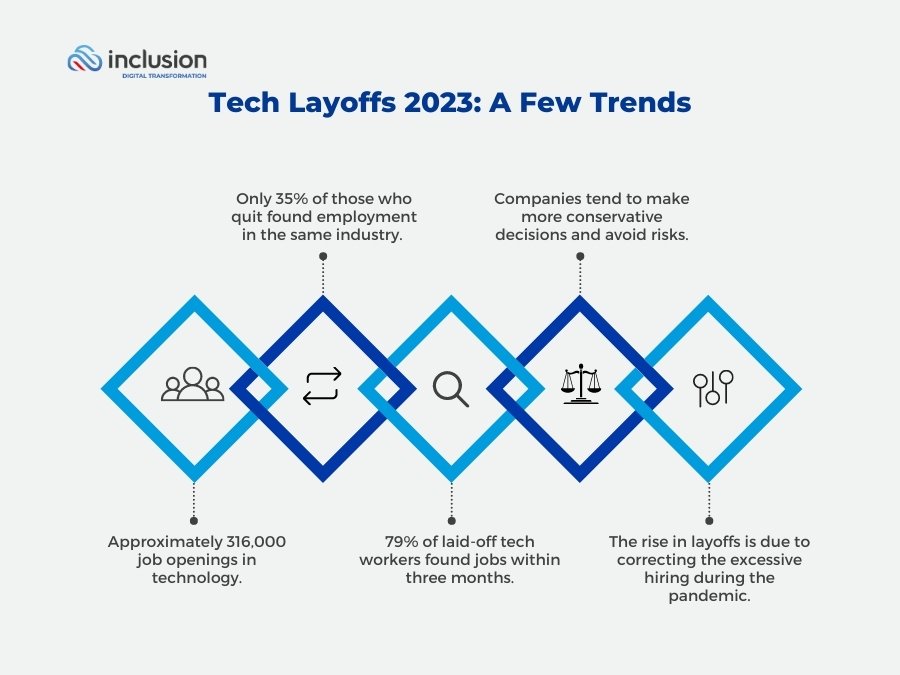The tech industry has been the driving force behind innovation and economic growth for many years. However, the recent economic downturn and other challenges have impacted the industry, causing some companies to lay off employees and cut back on expenses.
Despite this phase of transition that major tech companies are going through, we believe that there may be light at the end of the tunnel. Not only does the technology industry require technology professionals, but industries of all types are increasingly demanding technology skills for innovative solutions to improve their processes, improve efficiency and optimize costs.
Below, we’ll look at what opportunities exist for companies in other industries, such as energy, finance, and retail, among many others, to hire top technology talent to help them transform and enter the digital era.
Tech Layoffs 2023: A Few Trends
In terms of hiring and layoffs, the tech industry has seen a shift in the wake of the pandemic. While the demand for technology professionals with expertise in high-demand areas like AI, cloud computing, and cybersecurity remains high, some companies are struggling to find qualified candidates. At the same time, many tech companies have implemented layoffs to cut costs and survive the economic downturn. In 2022, the tech industry saw a 649% increase in layoffs, the highest since the dot-com bubble.
This series of massive layoffs is partly due to correcting the hiring of an excessive number of workers at the height of the pandemic when the use of technology grew significantly. However, some industries are now shifting back to a pre-pandemic pace, resulting in layoffs. Moreover, economic uncertainties and higher interest rates have caused companies to reevaluate their hiring and growth strategies, with investors pressuring them to decrease expenses as revenues slow down.
Despite these challenges, the tech industry still has many opportunities for growth and innovation, and companies need to adapt to the changing nature of work and focus on attracting and retaining top talent to succeed in the years to come.
Low unemployment rates and high demand
According to recent data, the unemployment rate in the tech sector is lower than in other sectors, and the number of job openings in technology continues to increase. In March 2023, there were approximately 316,000 job openings in technology, and 79% of laid-off tech workers found jobs within three months. However, companies are struggling to find qualified professionals in high-demand areas such as AI.
Good remuneration is no longer enough to attract and retain talent. Talent now prioritizes career advancement opportunities as well as other factors such as feeling meaningful in their work. And, if their expectations are not met, tech workers are increasingly willing to change jobs.
Changing nature of work
The ongoing trend of the Great Resignation has had a significant impact on the workforce, with 40 percent of employees globally considering leaving their jobs in the next three to six months. While this percentage remains unchanged from 2021, there are interesting nuances within this larger trend. Employees are not only shuffling between different employers but also transitioning to different industries, creating challenges for organizations trying to attract and retain talent. Some industries are disproportionately losing talent, while others struggle to attract skilled workers, resulting in a reshuffling of the talent pool.
Only 35% of those who quit in the past two years found employment in the same industry globally. This trend is particularly prominent in finance, insurance, and the public and social sectors, where a majority of workers changed industries.
Increased layoffs
The technology industry reached a decades-long peak in layoffs as a survival method to cut costs when revenue and profits get leaner. In times when consumption is decreasing and the costs of producing goods and services are increasing, companies begin to rethink their strategies and adapt to the new context of uncertainty. For this reason, leading technology companies have decided to start layoff processes to adjust their balance sheets and get through the tough times.
Economic uncertainty
With higher interest rates companies do not want to invest in riskier areas when the economy’s future is uncertain. These economic uncertainties prompt companies to reevaluate their hiring and growth strategies and investors expect companies to reduce expenses as revenues slow down.
In this context, companies tend to make more conservative decisions and avoid taking risks. However, another factor to keep in mind is that the world’s leading companies cannot afford to stop investing in technology. Technology enables companies to optimize operations, stay competitive, and adapt to changing market conditions, ultimately positioning them for growth and success even during hard times.
Correction in hiring
Part of the rise in layoffs is due to correcting the excessive hiring during the height of the pandemic when the use of technology grew significantly as everything moved online. Tech companies thought this would be the new normal, expanding their teams and growing quickly. However, some work is shifting back to the ways before the pandemic, and it no longer takes as many people to meet the needs of online consumers.

Challenges Facing the Tech Industry
The tech industry is facing several challenges that could have a significant impact on its growth and success in 2023. Here are some of the main challenges:
Talent shortage
The shortage of skilled professionals in high-demand areas such as AI, cybersecurity, and cloud computing is a major challenge. The increasing reliance of companies on technology for their operations means that the need for these skilled professionals continues to grow. However, there are not enough qualified candidates to fill all the available positions, leading to slower growth and reduced productivity for companies.
Rising cost of doing business
Inflation and higher interest rates are driving up expenses for many companies, while investors are pushing for increased profitability and decreased expenses. This has resulted in an increase in layoffs and cost-cutting measures across the industry, which can negatively impact employee morale and company culture besides the quality of products and services.
Flexibility at work
With more employees seeking remote work and flexible schedules, companies that are not prepared to offer these options may struggle to attract and retain top talent. This could result in higher turnover rates and a less experienced workforce.
Pace of technological change
The pace of technological change and disruption is accelerating, making it challenging for companies to keep up with the latest trends and innovations. Those that fail to invest in emerging technologies risk falling behind their competitors and losing market share. This makes it essential to have the technological skills to keep pace with innovations.
In conclusion, the tech industry is facing several challenges in 2023, from the ongoing talent shortage to the changing nature of work, and the need to keep up with technological change. Companies that can adapt and innovate in the face of these challenges will be best positioned to succeed in the years to come.
Opportunities for the Tech Industry
Despite these challenges, the tech industry still has many opportunities for growth and innovation. For example, the demand for AI professionals continues to grow, and companies are struggling to find qualified candidates. In addition, the rise of the Internet of Things (IoT), blockchain, and other emerging technologies will continue to create new opportunities for tech professionals and businesses.
To stay competitive in the ever-changing landscape of the tech industry, companies must also be prepared to invest in research and development. By dedicating resources to exploring new technologies and finding ways to improve existing products and services, companies can stay ahead of the curve and continue to innovate.
One major challenge facing the tech industry is the issue of data privacy and security. With more and more data being collected and stored by companies, there is a growing need for effective data privacy and security measures. Companies must be prepared to invest in the necessary tools and resources to protect their customers’ data and maintain their trust.
Another important trend in the tech industry is the increasing focus on sustainability and social responsibility. As consumers become more environmentally and socially conscious, companies in the tech industry must be prepared to address these concerns and develop products and services that are sustainable and socially responsible.
Opportunities for Other Industries to Obtain Tech Talents
As the tech industry experiences layoffs, other industries have an opportunity to obtain tech talents. Many of the skills required in the tech industry, such as programming, data analysis, and cybersecurity, are transferable to other industries, such as finance, healthcare, and transportation. These industries can offer competitive salaries and benefits to attract tech talents, which can help them innovate and grow.
Moreover, companies in non-tech industries can partner with tech companies to provide training and upskilling programs for their existing employees. This can help fill the gap in talent shortages and provide valuable skills for employees to enhance their career opportunities. In turn, this can improve employee retention rates and increase productivity.
Overall, the current layoff climate in the tech industry presents an opportunity for other industries to obtain tech talents and drive innovation and growth. By offering competitive salaries and benefits, and investing in training and upskilling programs, companies can attract and retain tech talents to help them succeed in the digital age.
Conclusion
In conclusion, the tech industry continues to face challenges in the form of economic downturns, layoffs, and other issues. However, there are still many opportunities for growth and success in the field, particularly in areas like AI, IoT, and blockchain.
By focusing on attracting and retaining top talent, adapting to the changing nature of work, embracing new technologies and trends, and addressing ethical concerns, companies in the tech industry can continue to drive innovation and economic growth for years to come.
No matter what industry a company works in, the challenge of the future will be the same: get the best technology talent to come up with innovative solutions to stand out in highly competitive markets, reduce costs and improve processes to prepare for the tough times and get off the ground when the good times come back.
Contact us if you want to gain access to top talent in cutting-edge technology. We would be delighted to help you with your digital transformation journey.





